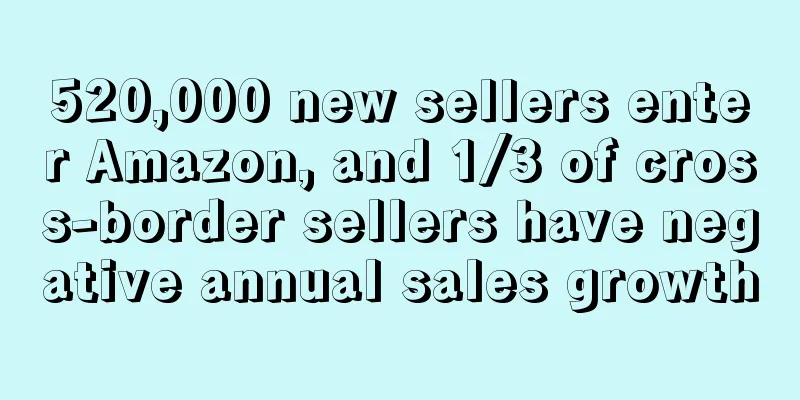520,000 new sellers enter Amazon, and 1/3 of cross-border sellers have negative annual sales growth

|
According to a survey of 300 sellers by an industry organization , nearly half of the companies had annual sales of over 10 million yuan, but compared with last year, more than one-third of the companies experienced negative sales growth, another one-third of the companies grew by less than 20%, and less than 10% of the companies grew rapidly.
It is no longer easy to do business on Amazon. Recently, there has been an increase in feedback about sellers transferring or closing accounts. One seller who chose to withdraw said that he just wanted to work properly and did not want to step into the cross-border e-commerce circle again. At the same time, a large number of traders and other newcomers continued to pour in. Some sellers compared it to domestic e-commerce and believed that Amazon was in a mid-stage of development.
The industry is constantly changing, and there is always a flow of operators. After working in the cross-border e-commerce industry for a few years, some operators choose to leave and switch to work as lawyers, editors, clerical workers, etc. The main reasons for their departure from the industry are high pressure and low salary increases .
The hot cross-border e-commerce is like a besieged city, people outside want to get in, and people inside want to get out. Overall, the number of domestic cross-border e-commerce companies is still growing steadily, and import and export data are also rising. This industry is on the rise.
520,000 new sellers join Amazon, and some sellers leave
Amazon's wealth creation myth has attracted many merchants. According to the latest data from Marketplace Pulse, 520,000 new sellers have joined Amazon this year, which is equivalent to 1,626 new sellers every day, or one new seller every minute. At this rate, there will be 593,000 new sellers by the end of the year.
What is the profitability of new and old sellers?
In October, Ebang Think Tank released the "2021 China Cross-border E-commerce Development Report", collecting and analyzing the operating conditions of about 300 cross-border companies, of which 59% have settled in Amazon.
Among the companies surveyed, cross-border e-commerce companies with annual sales of more than 10 million accounted for 46%, nearly half; but 35% of the companies said that their sales had negative growth compared with the same period last year, of which 13% of the companies had a sales decline of more than 30%, and 36% of the cross-border e-commerce companies were in a low-growth zone, with growth of less than 20%, and only 9% of the companies were in a high-growth zone, with an overall growth rate of more than 50%.
In terms of profits, 54% of enterprises have a profit margin of more than 10%, of which 10% have a profit margin of more than 20%. In the past year, cross-border e-commerce enterprises with a profit margin of less than 5% accounted for 16%. The decline in profits is a situation reported by many sellers this year.
As the platform is being rectified, profits are shrinking, and business becomes more difficult, some sellers are gradually losing confidence. Recently, a wave of Amazon sellers has withdrawn from the market.
This week, a seller said in WeChat Moments, "Don't ask me how Amazon is doing this year," and attached two screenshots. The pictures show that under the option "Are you sure you want to continue to permanently close your account?" in the background, he selected "Yes" and closed the account.
On the same day, another seller also posted a blog post expressing his feelings: Another old friend has quit Amazon.
During the chat, the seller who claimed to be forced to quit said: "I plan to give up doing Amazon completely. Are you interested in taking over my current Amazon account? I just want to work hard and don't want to step into the cross-border e-commerce circle anymore."
The seller said that his store was closed due to infringement in 2019. In 2020, he finally made some money and shipped a lot of goods. As a result, the return rate in 2021 was very high, and Amazon did not withdraw any money for a whole year.
Another seller said that there have been people selling Amazon accounts in the group recently, which is far from the hot trend last year. An operator couldn't help but ask: Is it difficult to do business on Amazon? The company has sold more than 100 stores and switched to Amazon training and agency operations.
Some of the sellers who left the market changed their roles because they were optimistic about the industry services, while some were persuaded to leave by the platform's strict rectification. A Putian seller said that almost all the companies that infringed on the copyright in a local office building had closed down. "Many bosses lost all the money they made in the past few years, and those who just started this year have lost all their money. Many employees who used to sell goods on BOSS Zhipin left to find jobs."
In addition to this time, a small number of sellers are unable to adapt to the higher operating threshold and longer operating cycle, and are unwilling to invest more money in Amazon and want to get out as soon as possible.
Regarding the situation of sellers this year, a seller with 6 years of experience calmly analyzed, "Every year, some are happy and some are sad. Although the overall market is bleak this year, there will still be many sellers who make money quietly. We should remain optimistic about the development of the industry. This year, it is not just Amazon that is involuted. All industries at home and abroad are involuted. It doesn't matter if Amazon is not doing well. We should treat it as a long-term thing and a way of foreign trade and export, and our mentality will be much better."
Another seller who has been on Amazon for 5 years believes that the current difficulty of Amazon is to become high-level and have a threshold, which is worth investing more energy in. Taking product selection as an example, products without a threshold are the most difficult to make, because anyone can get involved, and even the blue ocean category will become a red ocean.
"After the peak season ends this year, some people should leave the industry. The first will be the novice sellers sent in by training institutions every year, and the second will be the sellers dragged down by inventory. At the moment when internal competition is serious, the sellers who can survive and make money are the results of past accumulation and deep cultivation. As for the dying sellers, they can only seek new breakthroughs, otherwise they can only finish the run and then leave." he said.
Capital enters the "fight", Amazon enters the melee stage
After experiencing a period of rapid development, the cross-border e-commerce industry seems to have been put on pause this year.
Since the beginning of this year, the tightening of policies on various platforms, rising logistics prices, congestion at European and American ports, and lack of consumer confidence have all affected the business of cross-border sellers to a certain extent. In April, Amazon's platform banned accounts for review violations, which affected many sellers. Some sellers joined in, while others were forced to withdraw.
Amazon seller Chen Zhen said that he has seen cases of sellers quitting. The reasons are nothing more than business and profit. This year, the business difficulty of sellers has increased sharply. It is very difficult to create new products, and the cycle of creating hot products is relatively long. On the one hand, the platform is cracking down on fake orders, and on the other hand, the profits of sellers have decreased significantly compared with before. Everyone's risk controllability is not strong, and capital also looks down on Amazon. High risk and high return are originally a false proposition.
Chen Zhen believes that he is just a small seller. If he does not complete the transformation in time, he will be like Tmall now, unable to withstand the crushing of big sellers, because the market is open. Chinese sellers account for a large proportion of Amazon, so the development history of Tmall can be used to predict Amazon.
If we use Tmall as an analogy, Amazon is currently in a mid-term melee stage.
Amazon sellers competing in the same field must compete in resource integration, that is, supply chain integration, in the early stages. If a category is set for product selection, as long as there is demand for a product in the category, regardless of the size of the demand, sellers with a strong supply chain can monopolize it. Therefore, in the beginning, many Amazon sellers basically make money without doing anything.
Amazon has basically developed to the mid-term stage now. In other words, a large number of traders including some manufacturers have begun to enter. However, some large manufacturers who are slow to realize the trend may still look down on it, because large manufacturers generally lag in transformation and it is difficult for a big ship to turn around.
When it comes to the third stage, it involves a high degree of monopoly by brand owners. Nowadays, some sellers will register some small brands just to upload products, but after developing to a certain stage, these brands need to be operated seriously, and they need to promote and market in various channels and consider how to upgrade brand products.
The final stage is about brand competition. Brand operation definitely needs capital promotion. It is impossible to compete on the Amazon platform with just products. The competition in the seller's home has actually become a competition of brands. Because Amazon is a platform, it is impossible for the platform to allow a certain brand to dominate or monopolize. This is not in its own interests.
Therefore, the higher stage of cross-border e-commerce development is independent station. At present, many sellers are also opening up independent station channels.
In fact, there have been independent websites in China for many years. The former Vancl, Jumei, and some shoe websites are all considered independent websites, but there is no habit of buying things on independent websites in China, and many of them have disappeared now. There is soil for independent websites abroad, and its payment system is very complete. If you connect to a certain payment tool, it will favor consumers. If you don’t ship, your funds will be frozen or even your account will be blocked. Therefore, the obstacles to building independent websites abroad are much smaller.
But for many sellers, it is still difficult to run an independent website. Chen Zhen agrees with this point. He said that the promotion cost of an independent website is indeed high. Currently, one click on Amazon costs 20 yuan, which is much more expensive than in China. Promotions such as Google are also quite expensive, so independent websites are very expensive.
At present, cross-border sellers who do not have the strength to build their own independent websites need to think about how to survive on third-party platforms to avoid being eliminated.
From the perspective of not being eliminated, Chen Zhen believes that sellers must first survive. The prerequisite for survival is to ensure normal operating costs and make money normally.
Take Amazon as an example. The platform is product-oriented, not store-oriented, so sellers need to create popular products as much as possible. Only when the products can make money can the sellers avoid being eliminated. On the contrary, if the products cannot make money and are always in a loss-making state, it will be difficult for the sellers to survive.
As a small and medium-sized seller, you should not think too much about the development stage, and you should not consider capital. Because if a capital party wants to occupy a category on Amazon, it may compete with low prices. Capital parties are rich in resources and have strong capital. The cost of all aspects is low, which has a natural advantage. If the capital party enters the market to "fight", small and medium-sized sellers will definitely have no ability to fight back.
At present, from the perspective of the entire market competition, this situation does exist and there are many of them. Small and medium-sized sellers must have a sense of crisis. Therefore, small sellers first need to achieve a certain scale before thinking about transformation. Chen Zhen continued to introduce.
Not only do sellers need to transform, but operations in the cross-border e-commerce industry also face transformation challenges.
Operational transformation is difficult, and many people change careers directly
This year, Amazon's platform policies were tightened, and a crackdown on fake reviews was launched without warning, which not only stunned the sellers but also stunned the operators in the industry.
After the rectification, a large number of sellers, fearing that their accounts would be blocked, began to abandon the extensive fake order operation model and switched to refined and compliant operations. Some operators were asked to stop fake orders and other illegal operations. Xiao C, an Amazon operator in Shenzhen , said that before, fake orders would inevitably be generated after the product was put on the shelves. If fake orders were not generated, it would be difficult to get reviews. On the Amazon platform, reviews have a great weight. Now that the company does not allow fake orders, they suddenly don’t know how to operate, let alone how to promote new products.
After the accounts of those who faked orders were blocked, some companies laid off employees internally. Those operations people who only knew how to fake orders found it difficult to find a job after being laid off, and many companies no longer accepted these operations people. Instead, operations people who operated in compliance with regulations and made products with heart became popular and their prices were raised.
Those operators who regard "brushing orders" as a skill are facing the challenge of transformation. It is difficult for some of them to change their mindset. After repeated failures in finding jobs, some have begun to think about changing careers and leaving the cross-border e-commerce circle.
Of course, there are other reasons for those operations to change careers, such as lower and lower profits affecting their commissions; being laid off by the company, etc.
A well-known company in the industry had its account blocked and its business was going from bad to worse. Zhang Cheng, an operator, voluntarily resigned and changed his career to become a lawyer. Because the company's business was not doing well and the profit was meager, Li Meng, an operator, returned to his hometown from Zhejiang and became an editor. There are many similar cases of operators changing their careers this year.
Xiaoke was still operating the Amazon home furnishing category in the first half of the year, and in the second half of the year, it became a promotional company that was in contact with PR media such as PR Newswire. Xiaoke said that after the company’s brand was blocked, it changed its strategy. The first thing it did was to streamline redundant SKUs, clean up leftovers online and offline, and streamline the team. Then the company adopted a one-brand-one-store strategy, retained high-quality supply chain products, and established a new project-level product idea, which has achieved initial results.
Hu Lin, an Amazon operator who has changed his career, said, "I started working for Amazon in 2017. It's been five years now. I haven't had any hits. In my best condition, I can sell 200,000 or 300,000 US dollars a month, which is considered a good quality screw. I don't have the heart to start a business, and not everyone is suitable for starting a business. This year, the pressure is quite high. My ability can't make waves in this big environment. In addition, my health is not very good, so I took a leave of absence for half a year. After that, I will choose an easy job, such as a clerical job. If it doesn't work out, I will go back to the village to farm. The villagers who were born and raised in the village are very good at growing vegetables and sweet potatoes. I hope everyone will buy my sweet potatoes then."
If you stop working for Amazon, what are you going to do? What can you do? This topic once became a hot topic for cross-border people. An operator said that Amazon's performance this year was very frustrating, and many people would think about changing careers and looking for a new job. Looking back on my years of working in cross-border, it seems that I have learned nothing. Apart from fake orders, flash sales, flash sales, discounts, and off-site promotions, there is not much value to be utilized.
Another colleague said that he has been working for Amazon for almost two years. He started working for a small company to learn practical skills, and later changed to a medium-sized company, but it is not a professional Amazon company. This year, he feels that it is getting harder and harder. But if he wants to change careers, he really doesn’t know what to do or what skills to learn.
If you stop working for Amazon, what will you do? (vote single choice)
I can't do anything else except delivering food. Selling food near e-commerce companies, giving 20% discount to Amazon customers Go back to my hometown to grow crops and sell oranges or grapefruits Be a service provider and continue to deal with people in this industry Live streaming, keep up with the trend
Crossing the border, the sun rises as usual
Although the voices of practitioners changing careers are getting louder, in reality, more sellers who say they want to quit are just talking about it verbally, as a daily complaint. One seller laughed and said: "They say that, but they still have to buy houses and change cars." Some sellers said frankly that this is just like the people in the company who say they want to quit every day, and those who leave are those who don't talk.
Sellers who have been operating in the industry for several years have accumulated a lot of experience, and Amazon has brought considerable income to most of them. Even though it is no longer easy to do business on Amazon, the focus of sellers' thinking is how to cope with it and stabilize their income, rather than slamming the door and changing their ways. After all, this is a sustainable business path.
For people outside the industry, cross-border e-commerce, especially Amazon, still has great appeal. The widely circulated story of Shenzhen Bay No. 1, the industry conference that was forced to be cancelled in the first half of the year due to too many participants... In the eyes of many outsiders, the cross-border track is emitting a dazzling light.
Qichacha data shows that there are 32,000 cross-border e-commerce related companies in China , and the number of registrations has been increasing year by year over the past three years. In the first three quarters of 2021, a total of 7,943 cross-border e-commerce related companies were registered, with an average growth rate of 90.6% over two years.
In terms of platform selection, Amazon is the first stop for many cross-border sellers to expand overseas; in terms of target markets, half of the companies have expanded into North America or Europe, and emerging markets such as Southeast Asia and the Middle East are also beginning to be explored.
In October, Li Kuiwen, spokesman of the General Administration of Customs, said that in the first three quarters of this year, my country's imports and exports continued to maintain a rapid growth trend. Among them, my country's cross-border e-commerce imports and exports increased by 20.1%.
The national support policies for cross-border e-commerce are constantly being released. In the second half of this year, the "Opinions of the General Office of the State Council on Accelerating the Development of New Foreign Trade Business Forms and Models" and other policies were successively issued to encourage the construction of overseas warehouses, facilitate the management of cross-border e-commerce import and export returns, and promote the development of cross-border e-commerce. The development goal of the " 14th Five-Year Plan for Business Development" mentioned that by 2025, the proportion of foreign trade in new business forms such as cross-border e-commerce will be increased to 10%.
The capital market has a keen sense of smell and began to focus on this trend in the second half of last year. According to statistics, there were 29 financings in China's cross-border e-commerce in the first half of 2021, an increase of 222% year-on-year; the total financing amount exceeded 7.81 billion yuan, an increase of 324.45% year-on-year. Industry service providers and independent station sellers are highly favored by investors.
There is personnel turnover in every industry. Even if a few people leave, the cross-border e-commerce industry is still bustling, and behind that wall, the sun is rising as usual.
Amazon, Seller, Career Change |
<<: Amazon launches apprenticeship system, sellers: No, thank you
>>: TikTok's latest hit, this wrinkle-removing patch is going viral
Recommend
Kaola.com launches luxury goods subsidy for the first time, GUCCI bags are 50% off
On March 2, Kaola.com launched its first luxury g...
What is Haimi Yanxuan? Haimi Yanxuan Review, Features
Haimi Yanxuan App is a global shopping e-commerce ...
What is Lifelong? Lifelong Review, Features
Founded in 2015, Lifelong is an Indian consumer d...
Breaking into the top 5 Amazon sellers, these giants are on the rise!
Business Insider , a well-known American blog med...
AirAsia partners with MaGIC to launch drone delivery service
Data shows that in 2019, the global drone package...
What is Earthremit? Earthremit Review, Features
<span data-docs-delta="[[20,{"gallery"...
What is Chuannuo Intellectual Property? Chuannuo Intellectual Property Review, Features
Chuannuo Intellectual Property (Shenzhen Chuannuo ...
What is Quantify
Quantify has a very basic dashboard showing you y...
South Korean social giant Kakao strengthens its e-commerce business
According to Korean media reports, Kakao, South K...
What is EAN code? EAN code Review, Features
The full name of EAN code is European Article Num...
What is My Logistics? My LogisticsReview, Features
My Logistics (Shenzhen My Logistics Supply Chain ...
Crazy! The March 15 deadline is approaching, get Amazon insurance for 2,688 yuan
Amazon insurance has reached a critical point. Ma...
What is Shoutcart? Shoutcart Review, Features
Shoutcart can help you find and analyze influencer...
What is Mulin Italy Overseas Warehouse? Mulin Italy Overseas Warehouse Review, Features
Mulin Italy Overseas Warehouse is located in Calv...
What is EasyExchange? EasyExchange Review, Features
Jianyihui is a comprehensive service platform inte...









